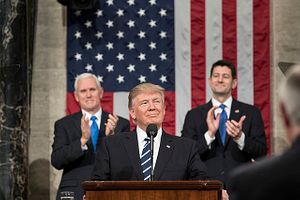On August 8, the Washington Post reported the assessment of U.S. intelligence sources that North Korea has considerably elevated the threat posed by the regime in Pyongyang. For the first time since North Korea’s nuclear problem first surfaced as a security challenge for the United States more than 20 years ago, Pyongyang now poses a direct threat not only to U.S. allies in Northeast Asia, but also to the U.S. homeland.
Responding to the latest development, U.S. President Donald Trump said any attempt to threaten the United States on the part of North Korea will be “met with fire and fury like the world has never seen.” While such saber-rattling rhetoric may make an excellent sound-bite, meeting North Korea with “fire and fury” is much easier said than done in reality. Any U.S. president who contemplates military actions against North Korea needs to be ready for the conflict to turn into the Second Korean War. Taking on such a military adventure would require the consent of the two U.S. allies in Northeast Asia — South Korea, which has seen the war on the peninsula before, and Japan, where most U.S. reinforcements will have to come through for a sustained U.S. military operation on the Korean Peninsula. In addition, Beijing — the guarantor of the North Korean regime’s survival, whether Pyongyang likes it or not — and Washington need to agree on the end-state of such a military action. Simply put, it takes more than a tweet and a statement to the press for the United States to execute a military option vis-à-vis the Korean Peninsula.
What is more problematic for the United States is that neither of its allies in the region is in a condition to agree or acquiesce to a U.S. military option easily. In Seoul, newly-elected President Moon Jae-in has been conflicted about how his new administration should respond to North Korea and remain close to its ally and security guarantor (the United States) without upsetting its relationship with its biggest trading partner (China). In Tokyo, Prime Minister Shinzo Abe faces a dwindling approval rate at home that, even with the recent cabinet reshuffle, cannot be expected to significantly improve without a notable improvement in the state of the Japanese economy. His decision on how Japan would support the U.S. military in case of armed conflict on the Korean Peninsula would surely be placed under extra scrutiny. Furthermore, given the aggravated diplomatic tensions between Tokyo and Seoul over the last several years, Washington has not been able to have an opportunity to discuss what a military operation on the Korean Peninsula to curb North Korea’s nuclear program would look like, what the role of Japan and South Korea respectively would be in a case of an armed conflict on the Korean Peninsula, and how the three countries should coordinate their actions during the contingency.
How the United States could work with China to ratchet down the current tension on the Korean Peninsula is also critical. Any military action that the United States might choose to take would have to be closely coordinated with China, a de facto security guarantor of North Korea. Coordination with Russia is also necessary, as Moscow would be happy to reach out to Pyongyang in the event that Beijing gets serious about implementing sanctions and squeezing North Korea.
Most importantly, Trump will also face a significant challenge at home should he attempt to execute a military option in North Korea. Already wary of prolonged military involvement in Afghanistan and Iraq (and more recently the fight against Islamic State), Congress would surely demand the administration to come to the Capitol for prior authorization of military action. As some senior U.S. senators, including Senator John McCain, have already aired their skepticism toward Trump’s reference to military action on the Korean Peninsula, it would be difficult for the Trump administration to get such authorization.
Simply put, it takes more than a series of declaratory tweets and statements from Trump for the United States to pull off a military action against North Korea, regardless of its scope. It not only requires close coordination with its allies in the region, which would feel the direct impact of a U.S. decision to launch military action against North Korea, but also requires diplomatic coordination with U.S. adversaries. The delay in nominating senior working level officials in Departments of Defense and State further complicates the coordination with its allies.
While Trump and Kim Jong-un run up an escalation ladder in their “war of words,” Tokyo and Seoul both should do whatever they can to work with the counterparts they have in the United States to rein in the U.S. president’s saber-rattling rhetoric in order to prevent the current crisis from spiraling into the Second Korean War.

































